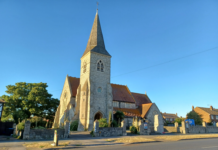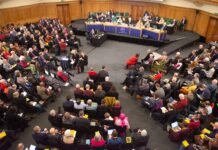Four Episcopal priests have been nominated for the next bishop of the Diocese of Albany. The candidates who make up this theologically diverse slate appear to have at least one thing in common: Whoever is elected on Sept. 9 is all but certain to become the first Albany bishop to allow same-sex couples to marry in the northern New York diocese.
The four candidates were asked specifically for their views on marriage equality in essay questions posed by the diocese. Their responses, posted online, range from the traditional theology for which the Diocese of Albany is known to one candidate’s open embrace of same-sex marriage.
Albany has been without a diocesan bishop since February 2021, when Bishop William Love resigned after losing a disciplinary case for his refusal to allow same-sex couples to marry in his diocese. He was the only diocesan bishop in The Episcopal Church who openly rejected General Convention’s 2018 compromise on the issue. After resigning, Love left The Episcopal Church to join the more conservative, breakaway Anglican Church in North America.
All four candidates to succeed Love called for healing in the diocese after past divisions. All four also indicated they would abide by General Convention’s mandate on marriage, though they vary somewhat in how they would carry out the diocese’s compliance.
“As bishop, I would authorize the use of the new liturgical rites [for same-sex couples] as approved by the General Convention,” the Rev. Neal Longe, one of two Diocese of Albany priests in the running for bishop, said in his essay responses. “This authorization would be made without need for waiver, special permission or the need for outside supplemental episcopal oversight.”
The Rev. Scott Garno, the other bishop candidate currently serving in the Diocese of Albany, alluded to listening sessions conducted by Albany’s Task Force on Communion Across Difference that were aimed at healing divisions in the diocese. “We must allow ourselves the opportunity to live in this uncomfortable place,” Garno wrote. “It is only through listening to each other, trusting each other, loving each other as siblings in Christ … that we will find a lasting peace.”
The Rev. Jeremiah Williamson, a bishop candidate from the Diocese of Colorado, said he supports same-sex marriage and personally had blessed two same-sex marriages. “Ultimately, I would like to see the [Albany] diocese create more room, make more space for a diversity of opinions,” wrote in his responses to the diocese’s questions.
The Rev. Geoffrey Ward, a bishop candidate from the Diocese of Milwaukee, described his theology as “authentically Anglican” and himself as “unapologetically Episcopal.” He assured the diocese he would avoid “any canonical crises” or schism on the issue of marriage. Instead, he pledged to start a process for reconciling diocesan canons with The Episcopal Church’s more inclusive definition of marriage.
“Honoring theological diversity would be a priority,” Ward wrote. “Seeking resolution and a mutual path forward would involve a basic commitment to respecting the dignity of every person, affording generous pastoral attention to every voice and seeking holy common ground on canonically sound footing.”
For the candidates’ full responses, in the order listed by the diocese, see below:
The talk of respect and reconciliation comes after years of tension in the diocese over the issue of human sexuality, including after Love resigned. In October 2021, those tensions flared at an online convention, amid an attempt to eliminate anti-LGBTQ+ language in the diocese’s canons. A vote on that measure was delayed over a procedural matter.
Then, in December 2021, the diocese announced its initial plan to comply with General Convention’s Resolution B012 from 2018, allowing priests and congregations to offer marriage rites to same-sex couples in the diocese.
The Rt. Rev. Michael Smith, previously bishop of North Dakota, has been serving Albany as assisting bishop to help with the diocese’s leadership transition. Though Smith personally opposes same-sex marriage, he agreed under the diocese’s plan to partner with Bishop Carol Gallagher, then serving as a regional canon in the Diocese of Massachusetts, to provide “supplemental episcopal pastoral support” for Albany clergy who wished to celebrate weddings for gay and lesbian couples.
In June 2022, the diocesan convention again took up the measure seeking changes to diocesan canons, and it was narrowly defeated. With sharp divisions still evident, the Albany Standing Committee paused plans to launch a new bishop search and instead created the Task Force on Communion Across Difference, led by Smith and Gallagher.
The goal was for Albany Episcopalians to find common ground while “recognizing our wide differences in belief, experience, and culture,” the standing committee said. “A significant part of the task force’s time and effort, especially at first, will thus be devoted to laying a necessary foundation of trust and building community.”
Those efforts also laid the foundation for the present bishop search, which launched in early 2023. The diocese announced its slate of four finalists on May 2.
Ward is rector of St. Christopher’s Episcopal Church in River Hills, Wisconsin. In his responses to the Diocese of Albany’s questions, he did not clearly divulge his own theological beliefs regarding marriage or say how he would uphold Resolution B012, but he indicated he would honor the diversity of beliefs in the diocese.
“I hold great respect for those who retain traditional views of marriage as espoused by the universal church for centuries,” he wrote. “I hold the same respect for people who embrace theological understandings new to the church. I hold the same respect for those who are indifferent, espouse moderated views, or even wonder why we act as agents of the state in performing marriages in the first place.”
Williamson is rector of Grace and St. Stephen’s Episcopal Church in Colorado Springs, Colorado. In addition to affirming his support for same-sex marriage, he spent much of his response to the question highlighting biblical and liturgical justifications for his belief while rebutting some of the counter-arguments commonly made by anti-LGBTQ+ Christians.
Many of the biblical passages “that are often used to condemn homosexuality are certainly not about modern same-sex marriage and are very likely more interested in condemning sexually exploitative encounters than the affection shared by two adults of the same gender,” Williamson wrote.
Longe is rector of St. Ann’s Episcopal Church in Amsterdam, New York. Longe noted the church is trying to respond to complex theological questions regarding marriage. “The Episcopal Church has made pastoral provision by expanding the definition of marriage to allow for same-sex couples to enter into this sacrament or covenant of self-sacrifice and love,” he wrote, adding that the church also respects the conscience of clergy who disagree.
“I support the provisions that the church has provided,” Longe said. “I believe that these provisions allow couples and clergy to live and minister in accordance with their conscience and theological understanding.”
Garno is rector of St. Stephen’s Episcopal Church in Delmar, New York. He is the only candidate of the four who responded to the diocese’s questions by saying he believes marriage is intended by God as a relationship between a man and a woman, though he also acknowledged General Convention’s authority over dioceses on the matter.
“While my conscience would not allow me to give a blanket approval for same-sex marriage in the diocese, I would not stand in the way of them occurring,” he wrote. If elected bishop, he said he would continue the diocese’s existing arrangement of requesting a neighboring bishop’s oversight of the use of marriage rites for same-sex weddings. This “would only be in the area of marriage; I would remain the bishop of all parishes in the Diocese of Albany.”



